27 Sep 2023
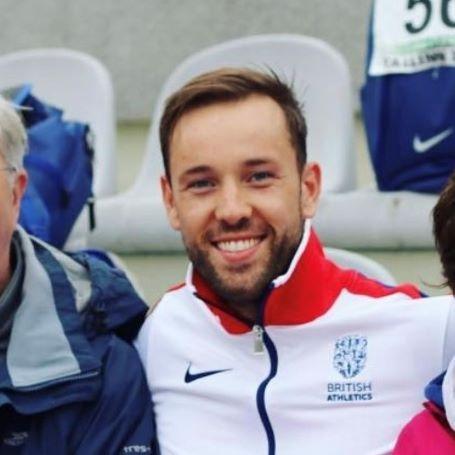
Former GB decathlete, Ben Gregory, was cycling home from teaching a professional coaching session in London when a car appeared in front of him, driving on the wrong side of the road.
Ben was hit by the car and thrown off his bike. Unaware of the accident, at home, his family received a call.
“We were relaxing on the sofa, it was a Friday evening and a pizza order had been placed,” said Aimee, one of Ben’s sisters. “My sister, husband and 10-month-old baby were with me when our family WhatsApp group rang – Ben’s girlfriend was calling the whole group.
“She said she’d had a call from the police. Ben had been in a serious accident and we all needed to get to the hospital now. We had no idea what had happened or what his injuries were.”
During the impact of the crash, Ben had gone through the windscreen of the car – his scalp had been degloved; all the skin on his head had been peeled back with his helmet. His skull had sustained multiple fractures and he was suffering from a bleed on the brain and multiple brain haemorrhages. His Glasgow Coma Score, which is a tool that clinicians use to assess consciousness level, was rated the lowest it can be. This was a big concern for London’s Air Ambulance’s advanced trauma team, who was dispatched to the scene. Ben was critically injured.
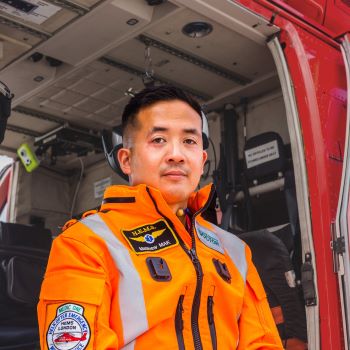
Dr Matt Mak, one of London’s Air Ambulance’s crew who attended to Ben that evening, said: “We arrived fairly early into an evolving scene and had been told Ben had been found face down and was making abnormal movements. On assessment he had signs of a severe head injury. We knew immediately that he required an emergency pre-hospital anaesthetic in order to take control of his breathing and help prevent any secondary brain injury.”
Our crew induced Ben into a coma at the roadside – this is something only our crew can do in London. He was then taken to a major trauma centre where he was met by a trauma team of over 20 clinicians. The priority was to scan his brain. He then had a brain pressure monitor inserted and the wound on his scalp was closed.
“We were all in the waiting room at the hospital, sat waiting for any news for about two hours. We were finally allowed to see him, before he was moved to the Intensive Care Unit,” said Aimee.
“When I first saw him, I nearly passed out. The doctors had to get me a chair. Ben didn’t look alive, there were machines and tubes everywhere. His face was so swollen he didn’t look like Ben. I went to stroke him, but the doctor said I couldn’t as Ben had multiple facial fractures and the smallest touch could make it worse.
“I will remember that moment for the rest of my life – it was extremely haunting and distressing to see him like that.”
Most of Ben’s organs were being supported by life support and he had extensively injured his brain. No one knew if Ben would survive through the night. If his brain stem was irreversibly damaged, he would never breathe on his own again.
“Every hour was critical. The clinicians said if he did pull through, it would be six months minimum in hospital, but no prognosis was known. That evening, all our lives changed forever,” said Aimee.
“We all had to adjust – we all reprioritised so that Ben was the number one. Work and social lives took a back seat, Ben was our priority from here on out.”
Ben remained in an induced coma for nearly three weeks. When reducing the sedation, many complications arose – the pressure in his brain kept increasing.
“After many failed attempts at reducing Ben’s sedation, the doctors informed us that they could not keep Ben on this level of sedation any longer. If the next attempt was not a success, they had run out of options for Ben. That was the worst day. It was now or never.”
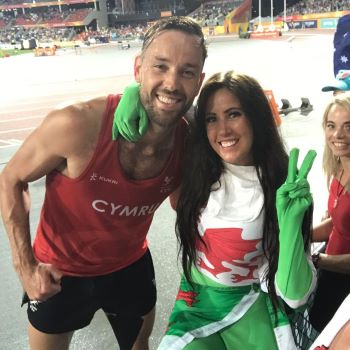
Ben’s support network ranged from family, friends and colleagues and totalled to over 300 people. “We updated the group and asked everyone to pray for Ben, to manifest whatever positivity they could to Ben. Shortly after that, we got a phone call from the doctors.”
For the first time, the sedation had been reduced and the pressure in his brain was stable. He was still critical and on life support, but the first good step had been taken. The next step was to see if he could breathe on his own. Although he was still on a ventilator, it was imperative that he also took some breaths of his own and the team monitored this every day.
“They said he was managing to take his own breaths and had a strong pulse. It was incredible. These two things had been so complicated, but now we’d ticked them off. We celebrated a little – he was going to live.”
That was the beginning of a very long and hard journey for Ben, his family and Ben’s girlfriend, Naomi. Ben remained in hospital for a further three months and then was moved to a neuro-rehabilitation clinic, where he was for another six months.
When he arrived at rehab, Ben could not walk, talk, eat or go to the toilet on his own. He was still being hoisted in and out of bed and was being fed via a tube to his stomach. He was severely disabled. He had to relearn everything, starting from scratch. But rehab provided him with a private room, a team focused on him and a full diary full of therapy sessions.
“His recovery massively accelerated at rehab,” said Aimee. “They were getting him to do things he hadn’t been able to do for months. By his birthday he was even able to eat some cake, which was so lovely to see. On his birthday, he took his first steps – another milestone met.”
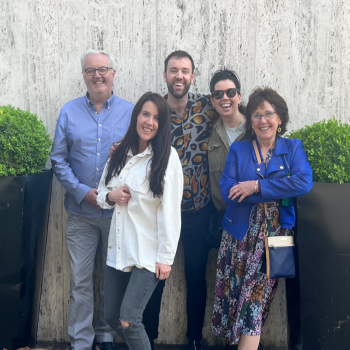
During his hospital stay, Ben had lost a significant amount of weight, especially considering the muscular shape he had been in before.
“Ben lost nearly four stone. At the worst, he was quite terrifying to look at,” said Aimee. “But when he started to be able to eat and enjoy food again, you saw him put on weight and it was like watching our Ben slowly return to us.”
In May 2023, Ben was discharged from rehabilitation and returned home. He is living with Naomi near the Olympic Park, walking his dog and watching the athletics training. Ben still has not got his full memory back – he lost the most recent seven years of his life – and he is classed as a vulnerable person.
A support worker lives with Ben 24/7 currently, as he is not able to live independently yet. His cognitive impairments mean he does not handle emotions very well and he could easily be taken advantage of in the wrong situation. His support worker is helping him to relearn socially acceptable behaviour and the hope is Ben won’t need one for the rest of his life.
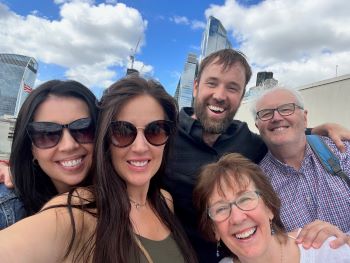
“We are so thrilled that Ben is alive, here with us, walking and talking and defying all the odds that were set against him,” said Aimee.
“Of course, there is sometimes a creeping feeling where you want to mourn what he’s lost, but you have to remind yourself not to do that. He so easily could have died that day, we have to celebrate the fact that he didn’t. He is more Ben than I thought he ever would be. His personality and sense of humour is the same, he is still our Ben.”
When Aimee and her family realised London’s Air Ambulance was a charity, they were shocked.
“We know 100%, that if the air ambulance had not been in existence, Ben would have died. He would not have survived the time it would take to get to hospital. Without their skills at the roadside, he wouldn’t have made it. They’re the reason Ben is here.”
“So, when people asked if they could help us or do anything, we said donate to the charity. Within five days we’d raised £10,000!
“Now, I am a volunteer for the charity. Not enough people know it is a charity, I want to the spread the word and raise awareness. We all owe our lives to the air ambulance.”
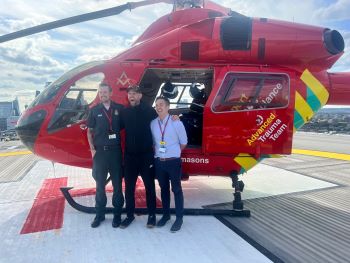
Dr Matt Mak said: “It was so good to see Ben when he came to visit with his family, girlfriend and support worker – he has made some amazing strides in his recovery. His rehab journey has been incredible to follow and it is fantastic to see him go from strength to strength.”
Aimee and her family played a crucial part in Ben’s recovery, dedicating their time and energy to help him however they could.
“A patient’s recovery is so dependent on the support of their family, whether the family are there supporting and encouraging or sat there crying. We all decided together we were only going to be positive and focus on Ben getting better. It is hard, of course, to shift your mindset and focus on the great things that could happen and not the bad things that have happened, but Ben’s recovery was dependent on it, so we shut down any negativity.
“If I was to give advice to another sister who was going through the same, it would be to do that. Always be doing something to positively help the recovery. Focus on today only and try not to get too far ahead of yourself.”
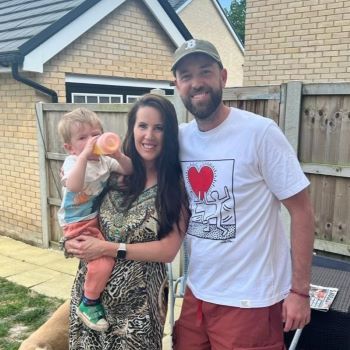
Earlier this year, Ben, Aimee and their family attended a screening of a film that told the recovery journey of another patient, Jordan. Jordan had also been hit by a car whilst cycling and suffered a brain injury. Since the accident, Jordan and his employer Hogarth made a short documentary to tell his story, while fundraising for London’s Air Ambulance Charity.
“That was one of the most incredible days of my life. Jordan and Ben are so similar and it was invaluable for Ben to meet someone else who had been through the same thing. I hope Ben can go on to do great things like Jordan has.
“I’m so proud to be a volunteer for a charity that helps keep families like ours together. We’re so thankful.”
You can read more about Jordan’s story here.

